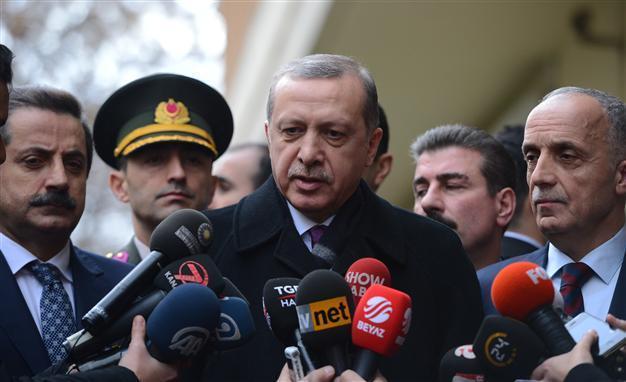Turkish President Erdoğan’s former chief guards on trial for spying
ANKARA

Former PM Erdoğan’s chief guards have begun standing trial for allegedly planting bugs in the current president's office in an illegal wiretapping case. AA Photo
An Ankara court conducted its first hearing on Jan. 2 in a case into the illegal wiretapping of former Prime Minister, now President Recep Tayyip Erdoğan’s offices, with some of the leader’s top guards accused of planting bugs to eavesdrop on Erdoğan.
One of Erdoğan’s bodyguards, Zeki Bulut, said he “devoted” himself to Erdoğan, but he is now accused of “betraying” the former prime minister.
The Ankara 7th Court of Serious Crimes has made Erdoğan, who was elected as president in August 2014, and the Prime Ministry parties to the case.
The court also rejected demands by the eight defendants present at the first hearing that they be discharged. There are 13 total suspects, but five police officers who are implicated in the case have yet to be apprehended.
Erdoğan’s security chief at the time, Mehmet Yüksel, said they had searched for possible bugs in every venue where the prime minister delivered speeches, but they realized during the investigation that regular searches were not conducted in Erdoğan’s residences.
They proposed to the Police Department that two searches a month should be conducted in both Erdoğan's house and his official residence, but carrying out bi-monthly searches proved difficult due to his busy schedule, Yüksel said.
“But I don’t think our colleagues were evil-minded,” he said.
Yüksel said the first bug was found on Dec. 28, 2011. “It was very confidential information. The undersecretary invited me to his room and told me about the issue. He asked us to contact the intelligence chief and work on it. We did our best to reveal [the truth],” the police chief said.
According to the law, they did not have the authority to carry out searches, but they attempted to conduct the searches regardless. “At that time, the security of the prime minister had the utmost importance,” Yüksel added.
Ahmet Türer, the police chief at the Prime Ministry’s security department, said they had “no connection with the bugs.”
Erdoğan made public on Dec. 21, 2012, that wiretapping devices had been found in his office and home, describing the move as “open espionage.”
The prosecutor’s indictment said the suspects had planted bugs inside three electricity plugs in Erdoğan’s working office in Çankaya Palace and that the devices were used for political spying from Nov. 24, 2011, to Dec. 29, 2011, when they were discovered.
The indictment is also investigating six other bugs inside plugs in Erdoğan’s office at his residence in Ankara.
A prosecutor issued search warrants for the police officers involved in the probe last June. Eleven officers, including Erdoğan’s former chief bodyguard, were then detained at their homes on June 17, 2014, while a local police chief, who is suspected of planting the bug, was not detained because he was out of the country at the time.
The first six suspects were released following their interrogation by a prosecutor. An Ankara court later released the remaining five suspects in a ruling that was subsequently reversed by another local court.
The 11th Serious Crimes Court in Ankara, a higher authority, ruled to overturn all arrest warrants on June 27, 2014, citing a “lack of evidence” and stating that “there is no suspicion that the suspects may run away, manipulate the evidence, or put pressure on the witnesses.”
The court found irregularities with the search conducted to find the bug devices, while stressing that the report about the incident was not prepared by an expert. The ruling also emphasized that the images of the bugging devices were taken by the cell phone of Mustafa Varank, one of Erdoğan’s chief advisers.
